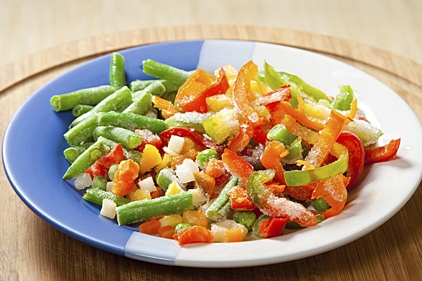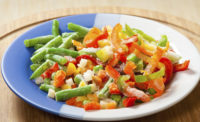While Americans struggle to add more fruits and vegetables to their diets, a recent study reveals one simple solution—frozen.
The Frozen Food Foundation, a not-for-profit organization dedicated to fostering scientific research, public awareness and education regarding the nutritional value of frozen foods, partnered with the University of California-Davis (UC Davis), Davis, Calif., to evaluate the nutrient content of eight commonly-purchased frozen and fresh fruits and vegetables—blueberries, strawberries, carrots, corn, broccoli, green beans, green peas and spinach.
The study, conducted by lead researcher Dr. Diane Barrett of UC Davis, used methodologies designed to eliminate discrepancies in the harvesting, handling and storage of fruits and vegetables. Like produce found in farmers' markets, the fruits and vegetables used in the study were locally grown, harvested and stored by the UC Davis research team. Each fruit and vegetable was analyzed under the following conditions—frozen (analyzed within 24 hours of harvest and after 10 and 90 days of storage in a freezer) and fresh-stored (analyzed within 24 hours of harvest and after three and 10 days of storage in a refrigerator).
Study results reveal that the nutritional value of frozen fruits and vegetables are generally equal to—and in some cases better than—their fresh counterparts.
"The study was designed to mimic the quality of produce found at farmers' markets or grown in consumers' backyards," says Barrett. "The study revealed that in most cases, frozen produce is nutritionally equivalent and often superior to its fresh-stored counterpart. In particular, the vitamin C content of frozen corn, green beans and blueberries was significantly higher than their fresh-stored counterparts."
The nutritional value of water-soluble vitamins—namely the amount of riboflavin (vitamin B2) and vitamin C (ascorbic acid)—was generally the same or greater in frozen vs. fresh produce.
The study also found that freezing has a positive effect on the vitamin E content of the fruits and vegetables as compared with fresh. Additionally, the nutrient value of five minerals (calcium, magnesium, zinc, copper and iron), fiber and total phenolics (health-promoting plant compounds) were for the most part well-conserved in frozen fruits and vegetables as compared to fresh.
"Freezing is simply nature's pause button," says Kraig Naasz, president of the Frozen Food Foundation and president and CEO of the American Frozen Food Institute, an affiliation of the foundation. "This research adds to a growing body of evidence that supports the important role frozen fruits and vegetables can play to help Americas meet daily intake requirements."

